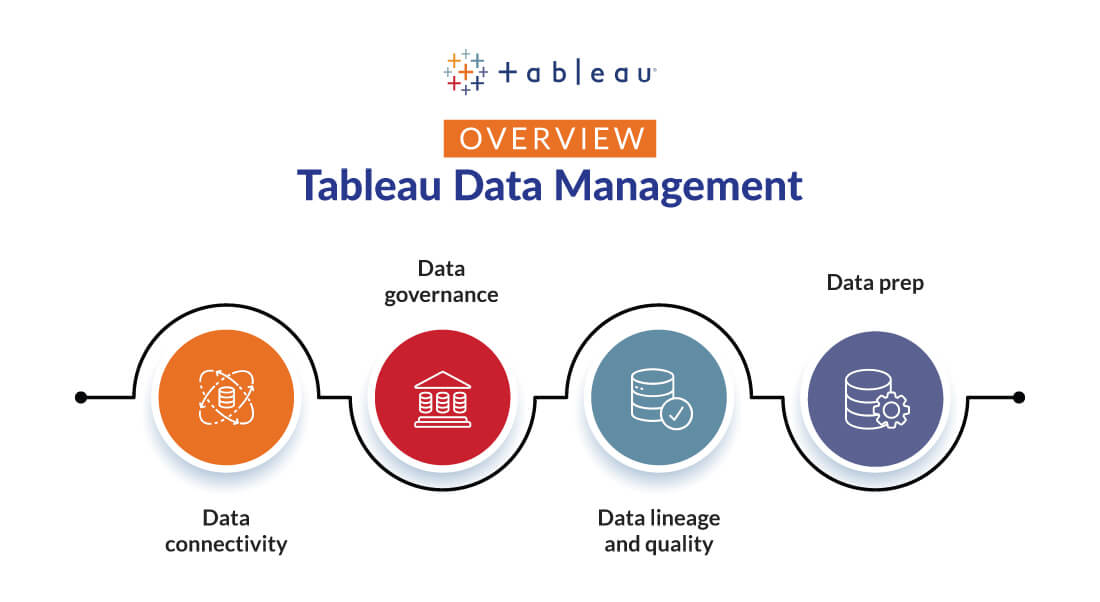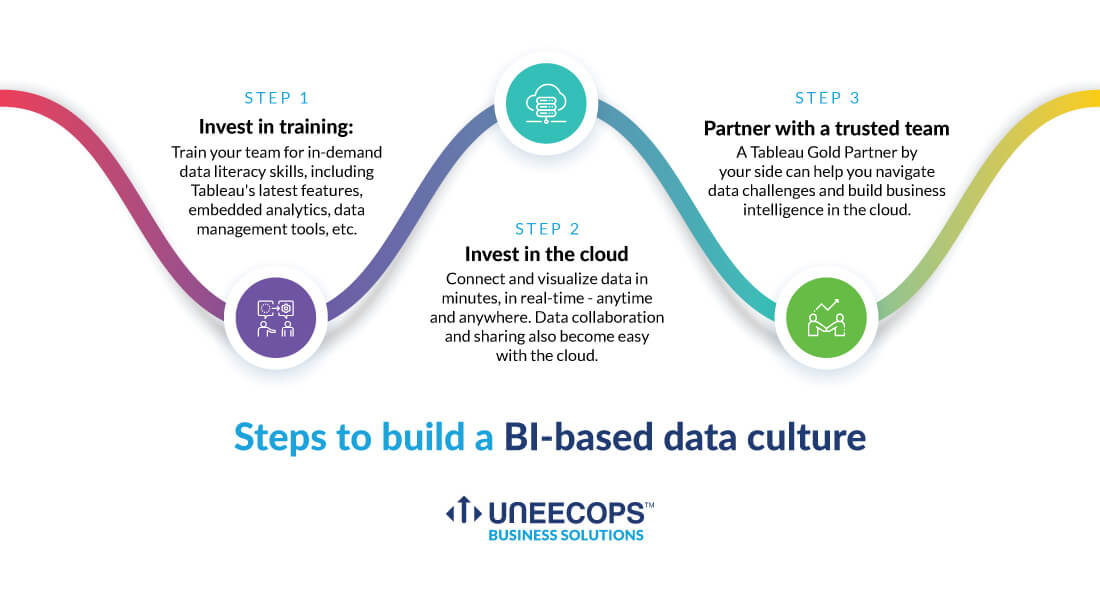Time and money are the scarcest resources. So the real meaning of business intelligence is to ensure you allocate time and money to the highest-impact areas. Data reveals impact, as everything in a business setup boils down to data. With big data analytics, you can bring more confidence to your decisions.
In the age of technological progression, where businesses and their competition are moving at neck-breaking speeds, timely decision-making driven by big data analytics is the ultimate differentiating factor. As digital advancements have revolutionized companies globally, businesses now have access to data-driven tools that allow them to learn more about themselves and their customers. These tools give them the ‘business intelligence’ edge.
All this sounds great, theoretically. However, data-driven decision-making, business intelligence and data analytics related investments fail to deliver ROI without an enterprise-wide ‘data strategy’.
While most businesses have access to data, and many even have analytics tools, an effective strategy is what they need to use data to their advantage (and tap its optimum potential).
It is time to combine the power of technology with business expertise to make fully informed decisions and stay light years ahead of the competition.
Data Strategy – The first step in powering business intelligence
Imagine building a structure without a blueprint. That’s what can happen in a business if there is no plan. Data strategy refers to a consistent approach allowing business functions to acquire, organize, analyze and deliver data for achieving business goals in a highly dynamic environment. After business goals have been established, a data strategy should be employed, with the entire company equipped to handle data accurately and comply with privacy and security norms. Data strategy helps determine where a customer or prospect lead is in their purchasing or decision-making journey.
Having a good data strategy means being able to review a cross-functional report or dashboard thoroughly. But the most efficient data strategies go beyond. They explore the why, how and deeper nitty-gritty of data possibilities.
Appropriately deployed data analytics can help companies better understand their customers, predict their choices, offer product recommendations, and create a 1:1 personalized decision-making purchasing journey. With a data strategy in place, driven by big data analytics, organizations can achieve business intelligence (BI). So, BI is actually an umbrella term for collecting, storing and interpreting data to derive practical, actionable insights in the overall business context to influence the top line and improve the bottom line.
As the world’s #1 analytics platform, Tableau recognized the importance of data strategy. The attempt to continually drive ‘great decisions using data,’ powered by a data-driven culture, is a key to future-proofing businesses for the world of tomorrow.
Let us understand how Tableau’s data management strategies make it simpler to discover, understand, connect, and trust your data.
Tableau Data Management and Data Strategy
Each organization has unique requirements for its data strategy, so a modern, self-service analytics solution like Tableau respects flexibility and gives a choice of use cases. Tableau data management capabilities have a way to certify data sources, so users know what data to use in their analysis. Once they analyze and obtain insights, they can drive better organizational decision-making. To manage data well, you need to include some crucial aspects in your strategy:

- Data connectivity – Plan to simplify data connections with shared access to data sources. Tableau allows you to create and share centralized access rather than connecting each dashboard/workbook independently. This allows you to ease management and consolidate extracts faster.
- Data governance – It is critical to ascertain data governance policies at the strategy stage to create a sustainable, cross-functional data fabric. Gartner has defined seven key foundations for modern data governance: Trust, Transparency and Ethics, Collaboration, Accountability and Decision Rights, Values and Outcomes. Tableau has data policies that enable row-level security configuration, ensuring limited data access.
- Data lineage and quality – Gartner provides a 12-action framework to improve data quality (DQ). A good strategy should accommodate data freshness, usage, and meaning. Tableau’s cataloging capabilities warn users of deprecated or stale underlying data sources to ensure they are working on the highest quality data for creating future-ready insights.
- Data prep – Continual data refreshments help organizations prep for forthcoming data chunks. Tableau Prep offers various data cleaning operations to deploy strong data preparation processes, which helps establish easy-to-understand data sharing.
With Tableau data strategy and data management, you can prepare your enterprise data in more agile ways that respond to business needs faster and better.
We’ve got the basics. While these are important from a planning perspective, the execution viewpoint differs. Another critical aspect of data strategy is data literacy and data storytelling.
Data Literacy: Understanding data management capabilities
We’ve heard leaders talk about data culture and its importance. To achieve data culture, the starting point is data literacy. In 2020, Gartner predicted data literacy to become an explicit and key business driver of business value by 2023. Now, as we approach 2023, data literacy has become an essential component of every business function. In the contemporary context, this would mean shifting employee mindset from ‘resistance to change’ to ‘acceptance of analytics.’
Employees must possess data literacy and skills to discover data insights using modern technologies such as Tableau embedded analytics. A shift in mindset can’t be an afterthought and must be prioritized by leaders to instill the necessary skills such as Artificial Intelligence, natural language processing, IoT, machine learning, etc.
Tableau is a Gartner-rated and recognized analytics platform used by 80,000+ customers worldwide. Investing in Tableau data literacy and upskilling at scale offers powerful benefits like improved decision-making, more innovation, better productivity, enhanced customer and employee experience, and more.
It’s a win-win for both the employees and the company.
As teams become data literate and a data culture begins to take shape in companies, the next big thing that matters is going beyond stats, dashboards and figures.
Data Storytelling: Automating insights and conclusions
Tableau recently launched a ‘Data Stories’ feature, which leverages artificial intelligence and natural language abilities to communicate insight and automate data analysis using easy-to-understand story formats. Data Stories aim to help users make meaningful decisions.
With simplified plain-language explanations within Tableau dashboards, users can understand and interact with data more rapidly and efficiently. This feature will help businesses address data literacy gaps by digitizing the data-driven stories process.
In Tableau, a story can be created using a sequence of visualizations. You can build stories to share data narrative, obtain context, showcase how decisions relate to results, or simply make a compelling case.
A story can be one sheet or a collection of sheets arranged in a sequence. Each sheet can be called a story point. When you compile and narrate the story —for example, by publishing a workbook to Tableau Server, Tableau Cloud, or Tableau Public—users can interact with it and draw conclusions as well as obtain information-rich insights.
Curious? We thought so!
After a data strategy comes working with real analytics.
Big Data Analytics: For Real Business Intelligence
Analytics power business intelligence with the use of AI and machine learning to enable data-driven decision-making.
Tableau uses AI to drive meaningful decisions with data. From one-click statistical analysis to ask data, explain data and data stories, augmented analytics allow users to learn what they need to know from their data with increased confidence in their results.
Read our previous blog to learn more about advanced analytics in Tableau: https://www.uneecops.com/augmented-analytics-empowering-business-decision-making/
Implementing data analytics
Organizations and decision-makers around the globe seek Tableau’s capabilities to increase engagement and promote a Data Culture. To make the shift to a data-first mindset to make decisions, it is critical to start with small but impactful wins. The infographic below shows how!

With so much potential to exploit in the use of data and analytics, these investments seem worth it. If not, ask yourself, ‘can my organization afford not to embrace it?’
UBS becomes your partner in building a data strategy to support your mission
Business intelligence is constantly evolving to keep pace with enterprise needs and technology. Artificial intelligence and machine learning will continue to grow, and businesses must integrate the insights from AI into the overall BI strategy. As companies strive to be more data-driven, Uneecops Business Solutions shares its analytical maturity to transform businesses with Tableau. We provide insights into achieving mission outcomes with data literacy. Our experts can help companies build a tailored data strategy that suits their specific business and its data requirements. To power data literacy and big data analytics for business intelligence, UBS’ Tableau specializations include:
- Business intelligence in the cloud
- Data security in business intelligence
- Data governance strategy
- Data management strategy
- Data analytics strategy
- Data migration strategy
- Big data strategy
The aim is to bring in business intelligence capabilities, enabling your business to leverage real-time sales tracking, discover insights into customer behavior, predict profits, and more. Companies from diverse industries like retail, manufacturing, and pharma have partnered with us for Tableau implementation, and more are joining each year. Our latest analytics platform offerings like data preparation in Tableau Prep, analysis and discovery in Tableau Desktop, and sharing and governance in Tableau Server or Tableau Cloud – help organizations address every step in the analytics cycle. As a Tableau Gold Partner, we are empowering more companies to explore their data and share their insights visually.
Join us on the journey to business transformation. Leverage Tableau to craft the perfect data strategy and utilize the best of big data analytics – ultimate business intelligence, in its real sense!







